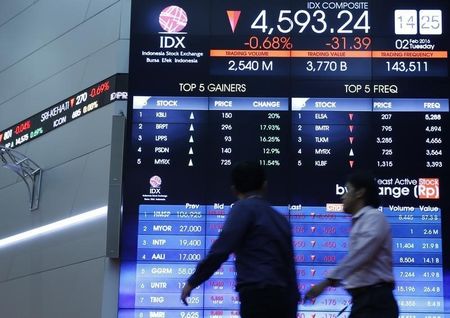AI Sentiment: Bearish
Reason: The article reports a fall in the IDX Composite Index, with notable decreases in several companies. It also mentions concerns about the impact of the US-China trade war on the global economy.
Indonesia's market ended lower at the close of trading, with the IDX Composite Index falling 1.17%. The worst performers of the session on the IDX Composite Index were Indah Prakasa Sentosa Tbk, which fell 24.92% or 830 points to trade at 2500 at the close. Meanwhile, Mitra Keluarga Karyasehat Tbk dropped 24.49% or 1275 points to end at 3930 and Mitrabahtera Segara Sejati Tbk was down 19.91% or 118 points to 475.
On the flip side, the top performers were Pool Advista Finance Tbk, which rose 34.96% to 50, or 13 points. Tifico Fiber Indonesia Tbk was up 34.67% to settle at 780 and Bank Mitraniaga Tbk rose 25.00% to 500 points. Falling stocks outnumbered advancing ones on the Jakarta Stock Exchange by 307 to 147.
Shares in Pool Advista Finance Tbk rose to all time highs, gaining 34.96% or 13 to 50. Shares in Tifico Fiber Indonesia Tbk rose to 52-week highs, up 34.67% or 200 points to 780. And shares in Bank Mitraniaga Tbk rose to 52-week highs, up 25.00% or 100 points to 500.
Elsewhere, crude oil for delivery in August fell 0.23% or 0.15 to hit $64.84 a barrel. The June Gold Futures contract rose 0.40% or 5.70 to trade at $1431.90 a troy ounce. Additionally, the US Dollar Index Futures was down 0.01% at 96.632.
In the bond market, the yield on the 10-year Treasury note fell 3.8 basis points to 2.14%, its lowest level since September 2017. This is due to investors growing increasingly worried about the impact of the trade war between the United States and China on the global economy. The yield on the 2-year note, which moves inversely to price, was down less than a basis point to 1.84%.
The IDX Composite Index is a benchmark stock market index for the Indonesia Stock Exchange (IDX). It consists of all stocks listed on the IDX, making it a broad measure of Indonesian stocks' performance. The index is market capitalization weighted, meaning that the companies with the highest market capitalization have the most influence on the index's price.




